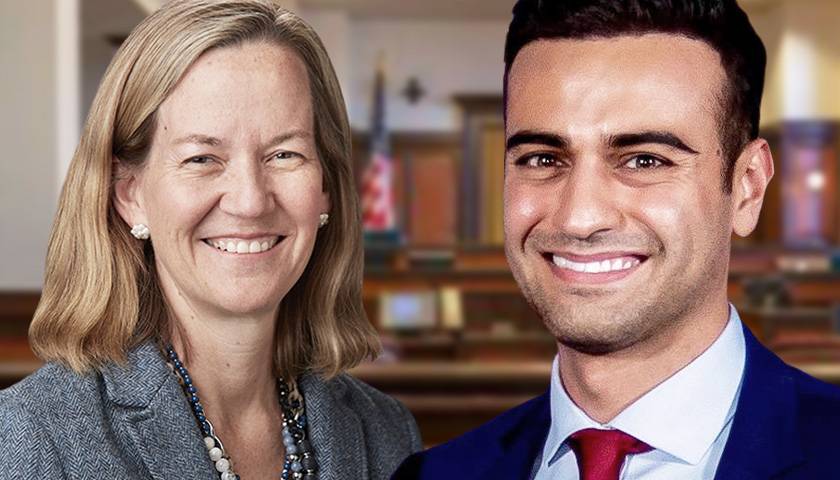Almost two months after hearing oral arguments to determine whether Abe Hamadeh should be awarded a new trial in his election contest, Mohave County Superior Court Judge Lee F. Jantzen denied the request on Friday. Hamadeh’s legal team requested the retrial based on discovering evidence that was withheld from them during the first trial; “undervotes” discovered in Pinal County that were erroneously not counted. The new votes shrunk Kris Mayes’ lead to only 280 votes. It is the closest statewide race in Arizona history.
Jantzen said in the short ruling that he will be issuing his full reasoning behind the decision on Monday by noon, stating that it was a “close call in a close contest.” Hamadeh responded in a statement, “[W]e believe the situation is very simple: the contest was not as close as it stands now. If all legal votes are counted, I win this race for attorney general.”
He said he will be appealing all the way to the Arizona Supreme Court.
“Taking on this legal challenge is the greatest honor of my life,” he said. “Free and fair elections matter. When we vote, the results should be accurate.”
Then-Secretary of State Katie Hobbs withheld evidence of the undervotes from the public and Hamadeh’s team until after Hamadeh’s election contest trial concluded on December 22, 2022. After hearing about the undervotes, Hamadeh’s team investigated and discovered that as many as 76,339 votes may not have been counted throughout the state.
Rule 59(a)(1) of the Arizona Rules of Procedure allows for a new trial if there is “newly discovered material evidence.”
The Arizona State Senate and House leaders, State Senator Warren Petersen (R-Mesa) and State Representative Ben Toma (R-Peoria) filed an amicus curiae brief in January supporting Hamadeh’s request for a new trial. On May 2, Twitter owner Elon Musk responded to a tweet of Hamadeh’s that listed election irregularities, “Strange.”
The America First Policy Institute conducted an investigation into Arizona’s 2022 election due to concerns about vote discrepancies and found “[a] potential 8,241-vote discrepancy was discovered between the total number of registered voters listed as voting and the total number of ballots counted in the 2022 Arizona general election, about 29.4 times the 280-vote difference in the attorney general race.”
Hamadeh’s team has been working in conjunction with the Republican National Committee analysts and outside investigators to track down provisional ballots that were erroneously not counted. Many voters discovered their voter registration address had mysteriously been changed to another county when they went to vote, forcing them to vote a provisional ballot. Many were surprised to see their vote was never ultimately tabulated.
Nearly 9,000 provisional ballots were rejected statewide during the 2022 general election, an unusually high number, and Hamadeh’s legal team estimates that, based on their research, at least 1,200 of them across roughly half of the state’s counties were “erroneously rejected,” Jennifer Wright, the former Election Integrity Unit civil attorney for the Arizona Attorney General’s Office who is now one of Hamadeh’s attorneys said, and there could be more. The remaining provisional ballots can be counted if a new trial is granted.
Elections have been overturned around the country for reasons such as discovering four voters were ineligible, hundreds of mail-in ballots discovered in a mailbox, and a poll worker informing voters that one of the candidates was deceased. In another case, a judge ordered a new election over one “irregularity.” In another, and finally, a judge ordered a new election where it was found that at least two candidates helped bring people to the town’s early voting location who were ineligible to vote.
In 1917, the Arizona Supreme Court overturned a gubernatorial election over a year after the alleged winning candidate had been in office, installing the challenger who’d asserted there was fraud instead. In that case, Hunt v. Campbell, “a meticulous review of the votes cast in the governor’s race was, in fact, outcome determinative.”
– – –
Rachel Alexander is a reporter at The Arizona Sun Times and The Star News Network. Follow Rachel on Twitter. Email tips to [email protected].
Photo “Abraham Hamadeh” by Abraham Hamadeh. Photo “Kris Mayes” by Kris Mayes for Arizona. Background Photo “Courtroom” by Carol M. Highsmith.








